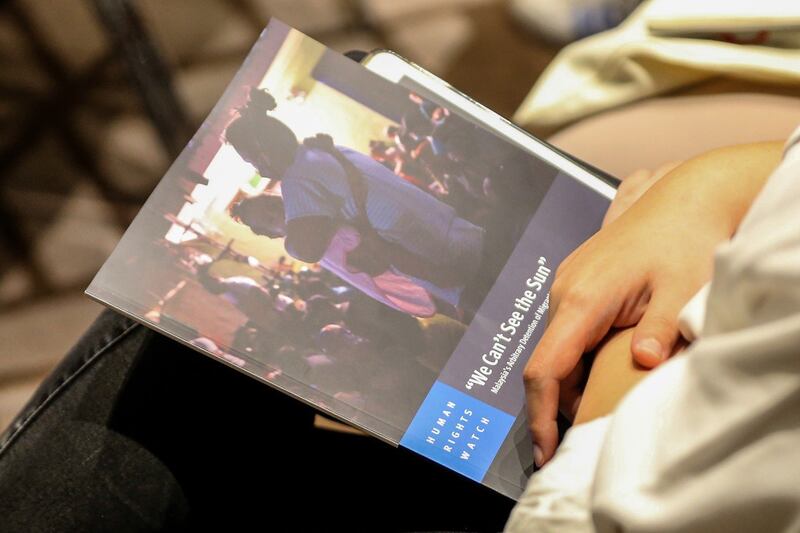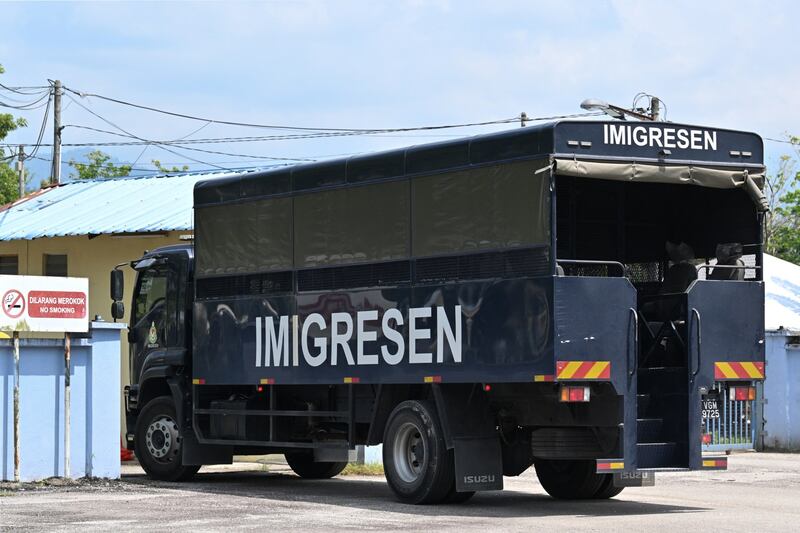Malaysia should provide alternatives for the 12,000 refugees, asylum seekers and migrants being held in overcrowded and “degrading” immigration detention centers nationwide, Human Rights Watch said in a report released Wednesday.
The "prolonged, judicially unsupervised detention" of these foreign detainees violates international human rights law, said the report that came out a month after more than 130 refugees broke out of a detention center in Perak state, with one of them struck and killed by a car while crossing a highway.
“Malaysian authorities are treating migrants as criminals, arbitrarily holding them for prolonged periods in immigration centers with almost no access to the outside world,” said Shayna Bauchner, Asia researcher at Human Rights Watch.
Malaysia has 20 detention centers nationwide that are primarily supervised by the Immigration Department where the undocumented are detained before being extradited, said the 60-page report titled "'We Can't See the Sun': Malaysia – Arbitrary Detention of Migrants and Refugees."
“Malaysia should seriously consider adopting measures used by other countries that better manage immigration objectives,” Bauchner said during a news conference in Petaling Jaya to announce the document’s release.
“Instead of maintaining abusive detention centers, the government should develop alternatives that protect the rights of children, refugees, and other vulnerable migrants.”
The 12,000 detainees living in these centers are a small fraction of the Southeast Asian country’s refugee and migrant population. Unofficial counts put the number of undocumented migrants in Malaysia at between 1.2 million and 3.5 million, the New York-based rights watchdog group reported. The migrant population is made up of people from Indonesia, Bangladesh, Nepal, Myanmar, India, and Cambodia, among others, according to HRW.
There are more than 180,000 refugees and asylum seekers registered with the United Nations refugee agency (UNHCR). More than half are Rohingya from Myanmar sheltering in Malaysia, which is not a signatory of the U.N. Refugee Convention, HRW said.
Refugees interviewed for the report described the centers as degrading and “abusive” while noting that the detainees – among them 1,400 children – were denied their basic rights.
The report noted that six countries offered alternatives to detention. In the United States detainees were released but were required to wear electronic monitoring devices; in Spain, they were released into a program where they were given housing and proper assistance including Spanish language classes.

Malaysia Home Minister Saifuddin Nasution challenged HRW’s allegations. He said the centers were holding more detainees than listed in the report but were not overcrowded.
As for children, he said some had been removed from the prime detention facilities and placed at child-friendly shelters. Malaysia has set up two such shelters known as Baitul Mahabbah – in Negeri Sembilan and Sabah – adding two more are in the pipeline.
“I know precisely the number of children in each center. Some of them I have removed from the detention and placed them at Baitul Mahabbah.
“On overcrowding, please mention it in detail which? Semenyih? KLIA? Tuaran? Please be clear to be fair so that we can get valid information on the situation,” the minister said.
“The centers were only overcrowded during COVID-19 because we could not send them home. Now there are 19 depots with 13,000 detainees, not crowded,” he told reporters in Kedah state.
Saifuddin did not address other allegations such as inhumane treatment.
Alleged abuses
HRW described gender-based abuse in the detention centers.
Some women were given one pad a day and were required to strip and show their used sanitary products before receiving replacements.
“Most women interviewed said that no sanitary products were provided. Some were able to request pads from visiting family members, while those with no visitors had to rely on other detainees or use torn clothing,” HRW said in its report.
The watchdog also claimed that women who gave birth at the centers were not given postpartum care or diapers for their babies, adding “rape victims were reportedly arrested for their lack of documentation when attempting to file a report with police.”
Men reported being hit, kicked and beaten with rubber pipes or batons, being sent to an isolation block, having meals withheld, doing squats and pushups.
Shortages of water for drinking and bathing were common complaints.
Quoting detainees, the report said scabies broke out in one of the overcrowded detention centers.
“If anyone was sick, we had to report to the officer and then the officer would tell the doctor. But when we would tell the officers that someone was ill, we were ignored unless that person was in critical condition,” the report quoted a detainee as saying.
HRW said the report was based on interviews of 43 people between January and March 2023, including 23 men and women who had been held in Malaysian detention centers. It also held a focus group discussion with 36 former detainees.
Anwar targeted
HRW also took aim at Prime Minister Anwar Ibrahim. The report said his government, which has been in power since November 2022, had done little in dealing with the plight of refugees despite his previous stand on protecting their rights.
In 2021, Anwar had challenged then-Home Minister Hamzah Zainuddin for not allowing the United Nations to be allowed inside to observe the detention centers.
“We are disappointed that nothing has changed. [We are also] disappointed on the lack of information and human rights [among the refugees and migrants],” Bauchner said.

Jerald Joseph, former commissioner at the Human Rights Commission of Malaysia (SUHAKAM), said detention centers were meant to be temporary.
“Why are some of them more than three months there? How come some Rohingyas have been in depots for five to six years,” he said at the report’s launch. “There is a lack of legal support for them as legal aid is only for Malaysians.”
Recommendations
The report called for the government to change its focus on detainees.
“Shift funding and resources from immigration detention centers to community-based alternatives to detention, with access to public services, housing, legal services, education and health care,” it said while urging the government to use interpreters as needed.
It also urged the government to allow detainees to have the means to communicate with family members and to implement programs legalizing the status of undocumented workers to address corruption and exploitation by employers.
Faribel Fernandez, management coordinator at Pusat Komas, a Malaysia NGO, said transparency was needed to ensure migrants are treated fairly and their rights are protected while ensuring detention centers are not overcrowded.
She said getting civil society organizations involved was key to bringing in fresh perspectives to deal with the issues, adding that setting clear rules for employment rights and standard procedures for immigration authorities would help create a fairer system. Pusat Komas aims to promote and enhance unity through the use of popular media.
“The government needs to demonstrate political will and engage in multi-ministry dialogues to enact these reforms effectively by looking at progressive models from our neighboring countries like Thailand to move forward,” she said.
BenarNews is an RFA-affiliated news service.
